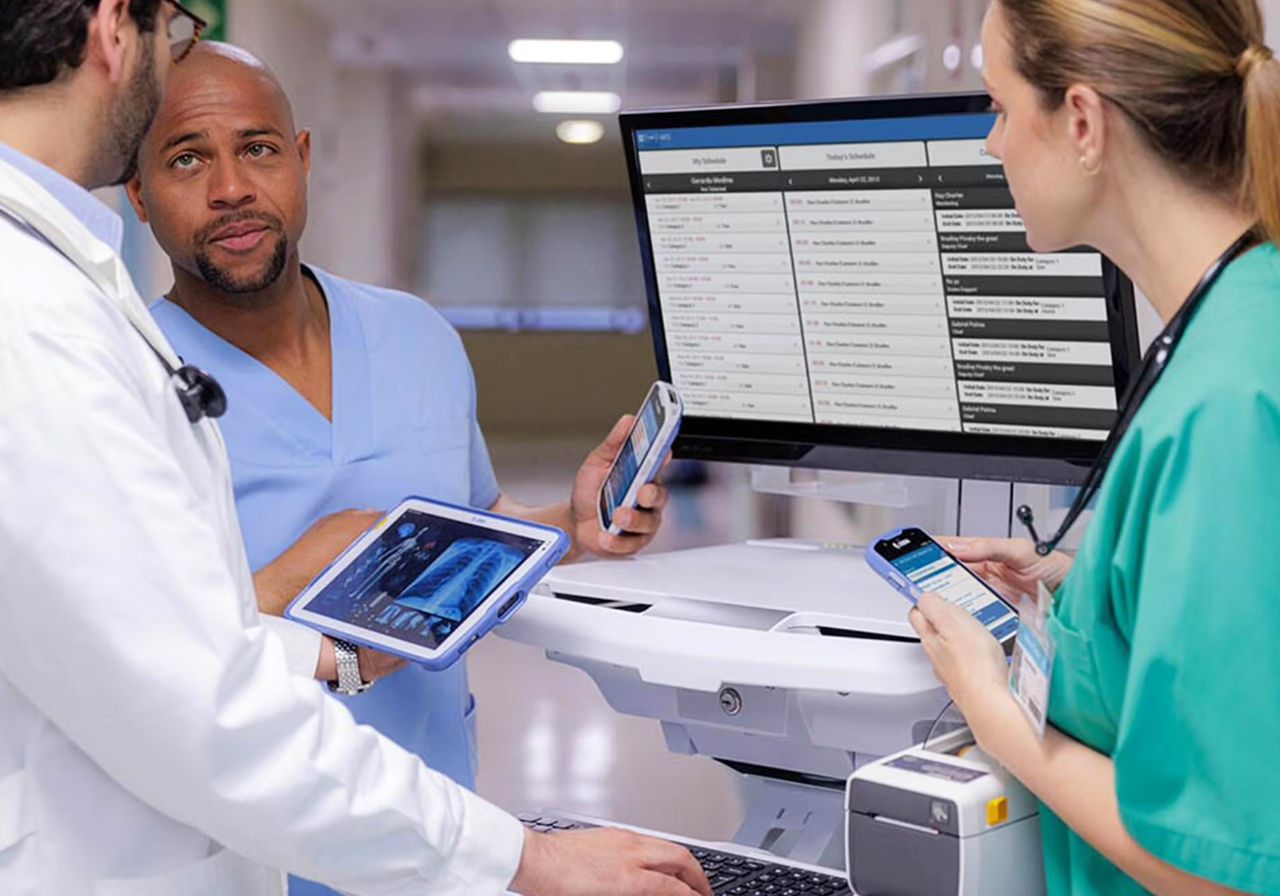Cloud technology has become a transformative force across various industries, and healthcare is no exception. With the increasing demand for enhanced efficiency, accessibility, and cost savings, cloud-based healthcare solutions provide an innovative answer to these challenges. Cloud technology is transforming how healthcare providers manage data, collaborate, and deliver care, unlocking new efficiencies and significantly improving patient outcomes.
From better data access and enhanced security to cost savings and greater scalability, cloud-based healthcare solutions are reshaping healthcare operations. In this article, we’ll explore the 9 powerful advantages of cloud-based healthcare solutions, explaining how they are revolutionizing patient care, boosting efficiency, and cutting costs in healthcare organizations.
Table of Contents
- What Are Cloud-Based Healthcare Solutions?
- 1. Improved Data Access and Collaboration
- 2. Enhanced Data Security and Compliance
- 3. Cost Savings and Financial Efficiency
- 4. Faster Access to Critical Patient Information
- 5. Streamlined Administrative Tasks
- 6. Telemedicine Integration and Remote Patient Monitoring
- 7. Improved Patient Engagement and Experience
- 8. Interoperability Across Healthcare Systems
- 9. Support for Research and Innovation
- How ViTG Cloud Technology Solutions Transform Healthcare
- Conclusion: The Future of Cloud-Based Healthcare Solutions
- FAQs

9 Powerful Advantages of Cloud-Based Healthcare Solutions: Revolutionizing Patient Care and Cutting Costs
What Are Cloud-Based Healthcare Solutions?
Cloud computing refers to the use of remote servers hosted over the internet to store, manage, and process healthcare data and applications. This eliminates the demand for on-premises hardware, allowing healthcare providers to access patient data and applications from any device, at any time, and from anywhere.
As healthcare providers are tasked with managing growing patient populations and rising operational costs, transitioning to cloud technology provides a scalable, flexible, and cost-effective solution. It empowers healthcare organizations to streamline operations, enhance care coordination, and improve security—all while reducing costs.
1. Improved Data Access and Collaboration
One of the primary advantages of cloud-based healthcare solutions is improved access to critical patient data and collaboration among healthcare teams. Cloud solutions enable healthcare providers to access patient records and data in real-time, from any location, using any device. This immediate access is crucial for delivering effective, timely care.
- Enhanced Collaboration: Healthcare teams including doctors, specialists, nurses, and administrative staff can easily share patient data and collaborate in real-time. This reduces delays and minimizes the chance of errors caused by incomplete or outdated information.
- Remote Access: Cloud solutions enable healthcare professionals to access vital patient information remotely, supporting telemedicine and improving care delivery for patients in underserved or rural areas.
- Streamlined Care Coordination: By centralizing patient data in the cloud, healthcare providers can eliminate silos between departments and improve coordination across various healthcare teams, ultimately leading to better patient outcomes.
2. Enhanced Data Security and Compliance
Data security is paramount in healthcare, given the sensitive nature of medical records and patient information. Cloud providers specialize in implementing robust security protocols that help healthcare organizations safeguard patient data and ensure compliance with regulations like HIPAA (Health Insurance Portability and Accountability Act).
- Encryption: Cloud services provide strong encryption for data both at rest and in transit, ensuring that patient information remains secure even when accessed remotely.
- Multi-Factor Authentication (MFA): Cloud platforms can incorporate multi-factor authentication, further strengthen access controls and ensure that only authorized personnel can access sensitive information.
- Compliance: Cloud solutions are designed to meet the regulatory requirements of healthcare organizations. Providers help ensure that your system remains compliant with laws like HIPAA, GDPR (General Data Protection Regulation), and other local regulations governing data privacy and protection.
- Disaster Recovery: Cloud-based solutions provide automatic backups and disaster recovery features, ensuring that critical healthcare data is not lost in case of system failures, cyberattacks, or natural disasters. This ensures business continuity and reduces the risk of data loss.

9 Powerful Advantages of Cloud-Based Healthcare Solutions: Revolutionizing Patient Care and Cutting Costs
3. Cost Savings and Financial Efficiency
Healthcare organizations often face tight budgets, and managing IT infrastructure can be a significant expense. Cloud technology helps healthcare providers save money by eliminating the requirement for expensive hardware, data centers, and IT staff to manage infrastructure.
- No Upfront Hardware Costs: Cloud-based healthcare solutions reduce costly on-site servers and hardware, reducing capital expenditures.
- Pay-as-You-Go Model: Most cloud solutions are offered on a subscription basis, meaning healthcare providers only pay for the resources they use. This makes it easier to manage and forecast IT expenses.
- Reduced Maintenance Costs: Cloud service providers handle maintenance, updates, and security management, eliminating the requirement for dedicated IT staff to manage on-site servers and software.
- Scalability: Cloud platforms allow healthcare organizations to scale their resources based on demand. If the number of patients or services increases, cloud-based infrastructure can easily expand without requiring for significant investment in additional hardware.
4. Faster Access to Critical Patient Information
The speed at which healthcare professionals can access patient data can directly affect patient care. Cloud solutions provide instant access to Electronic Health Records (EHRs), medical images, lab results, and other critical information. This improves decision-making and leads to better patient outcomes.
- Real-Time Updates: With cloud-based EHRs, patient information is updated in real-time, ensuring that doctors and nurses always have access to the latest data. This eliminates delays caused by waiting for physical records or outdated information.
- Time-Saving: Cloud technology allows healthcare professionals to retrieve patient records and other critical data much faster than traditional, paper-based systems, improving the efficiency of daily operations.
- Improved Patient Outcomes: Faster access to critical data allows healthcare professionals to make more informed decisions, reducing the time it takes to diagnose and treat conditions.
5. Streamlined Administrative Tasks
Cloud technology isn’t just beneficial for clinical care; it can also help healthcare organizations automate and streamline administrative tasks. Tasks such as scheduling, billing, claims processing, and patient registration can be automated using cloud-based solutions.
- Simplified Billing and Claims: Cloud-based solutions streamline the billing process by automating claims submissions and patient billing. This reduces the administrative burden and improves the accuracy of billing, resulting in fewer claims rejections and faster reimbursements.
- Automated Appointment Scheduling: Cloud technology can also streamline appointment scheduling, reduce missed appointments and optimize provider schedules.
- Time Savings: By automating administrative tasks, healthcare organizations can free up staff time, allowing them to focus more on patient care.

9 Powerful Advantages of Cloud-Based Healthcare Solutions: Revolutionizing Patient Care and Cutting Costs
6. Telemedicine Integration and Remote Patient Monitoring
Cloud technology is at the heart of the telemedicine revolution. With the rise of virtual care, cloud-based solutions are essential for enabling healthcare providers to conduct remote consultations, monitor patients from a distance, and improve access to care for patients in underserved areas.
- Cloud-Powered Telehealth: Cloud technology enables seamless virtual consultations between healthcare providers and patients, improving access to healthcare while reducing the demand for in-person visits.
- Remote Patient Monitoring (RPM): Cloud-based solutions allow healthcare providers to remotely monitor patients’ vital signs, medication adherence, and other health metrics. This reduces hospital readmission rates and helps prevent complications before they escalate.
- Enhanced Access to Care: For patients in rural or underserved areas, telemedicine powered by cloud technology enables access to healthcare services that they may not otherwise have.
7. Improved Patient Engagement and Experience
Cloud technology also plays a role in improving patient engagement. Patient portals, powered by the cloud, allow patients to access their health records, schedule appointments, request prescriptions, and communicate with their healthcare providers more efficiently.
- Patient Portals: Cloud-based patient portals give patients real-time access to their medical records, lab results, and treatment plans, encouraging them to take an active role in their care.
- Better Communication: Healthcare providers can use cloud technology to send automated reminders, appointment confirmations, and follow-up notifications, improving communication and increasing patient satisfaction.
- Self-Service Features: Cloud-based portals allow patients to request prescriptions, ask questions, and schedule appointments without having to call the office, reducing wait times and enhancing the patient experience.

9 Powerful Advantages of Cloud-Based Healthcare Solutions: Revolutionizing Patient Care and Cutting Costs
8. Interoperability Across Healthcare Systems
One of the biggest challenges in healthcare is data interoperability—the ability of different systems to exchange and use data. Cloud technology facilitates this by enabling the seamless exchange of data between healthcare providers, specialists, hospitals, insurance companies, and other stakeholders.
- Improved Data Sharing: With cloud-based healthcare solutions, patient data can be securely shared across different healthcare organizations, ensuring that all healthcare providers involved in a patient’s care have access to the same information.
- Streamlined Collaboration: Healthcare professionals can collaborate more effectively by having access to real-time data from multiple sources, improving the quality of care and reducing redundancies.
- Better Coordination of Care: With the ability to exchange data seamlessly, healthcare teams can coordinate care more effectively, reducing errors and improving patient outcomes.
9. Support for Research and Innovation
Cloud technology is also driving innovation in healthcare by providing researchers with the computing power and storage they required to analyze vast amounts of patient data. Cloud-based platforms facilitate medical research, clinical trials, and drug development, making it easier for healthcare organizations to innovate and improve treatment options.
- Data Analytics: Cloud-based healthcare solutions enable researchers to process large datasets, identify patterns, and generate insights that can drive new treatments and therapies.
- Faster Innovation: With cloud computing, healthcare organizations can accelerate the development of new treatments, bringing them to market more quickly and improving patient care.
- Collaboration in Research: Cloud technology allows researchers to collaborate across borders, pooling data and resources from various healthcare organizations and universities to advance scientific knowledge.

9 Powerful Advantages of Cloud-Based Healthcare Solutions: Revolutionizing Patient Care and Cutting Costs
How ViTG Cloud Technology Solutions Transform Healthcare
At Virtual IT Group (ViTG), we understand that every healthcare organization is unique, with its own set of challenges and goals. That’s why we specialize in delivering customized cloud technology solutions designed to meet the specific requirements of healthcare providers. Whether you’re in the process of transitioning to the cloud, enhancing your IT infrastructure, or scaling your operations, ViTG ensures that your cloud solutions are aligned with your organization’s objectives to foster long-term growth and success.
Our healthcare-focused cloud services provide the flexibility, security, and scalability required to navigate the complexities of modern healthcare, allowing you to deliver better patient outcomes while maximizing operational efficiency.
Key Benefits of ViTG Cloud Solutions for Healthcare:
1. Enhanced Scalability for Healthcare Operations
ViTG’s cloud technology solutions are built with scalability in mind. As your healthcare organization grows, your IT resources require to grow with it. Our cloud infrastructure allows you to scale resources seamlessly, whether you’re managing increased patient volumes, expanding your services, or adding new locations. With ViTG, you can effortlessly scale up or down based on demand without having to invest in expensive, inflexible hardware. This scalable approach ensures that you are always prepared for fluctuating workloads, providing the agility required to adapt to evolving healthcare demands.
2. Cost Efficiency
The financial pressure in healthcare is real, and cloud-based solutions provide an opportunity to significantly cut costs. ViTG’s pay-as-you-go model ensures that your healthcare organization only pays for the resources you use, helping you optimize IT budgets. By reducing costs on-premise servers, data storage, and maintenance, ViTG’s cloud solutions help you manage and forecast expenses more effectively. With our services, healthcare organizations can avoid large upfront capital expenditures and ongoing maintenance fees, allowing them to reallocate resources toward better patient care.
3. Seamless Collaboration and Care Coordination
Effective communication and collaboration are essential in healthcare, especially in multidisciplinary teams. ViTG’s cloud-based solutions enable real-time collaboration across various departments, facilities, and healthcare providers, regardless of location. Whether it’s a specialist consulting with a primary care physician or a nurse accessing patient data during a shift change, cloud-enabled systems ensure that patient information is always accessible to those who require it. Our cloud platforms also support telemedicine and remote monitoring, enhancing collaboration with patients and care teams in underserved or remote areas.
4. Robust Security and Compliance
Data security is a top priority in healthcare, and ViTG takes this responsibility seriously. Our cloud solutions are designed with the highest level of security to ensure that patient data remains protected from unauthorized access, cyber threats, and breaches. We use advanced encryption for data both at rest and in transit, and our 24/7 monitoring ensures continuous protection of sensitive information. Additionally, ViTG ensures full compliance with HIPAA and other healthcare regulations, giving healthcare providers peace of mind and reducing the risk of non-compliance penalties. Our disaster recovery solutions ensure that your organization’s data is always backed up and recoverable in case of any disruption.
Conclusion
As cloud technology continues to advance, its impact on the healthcare sector will only expand. From enhancing access to patient data and improving collaboration among healthcare teams to boosting data security and reducing operational costs, cloud-based healthcare solutions are transforming the way healthcare is delivered, making it more efficient, effective, and patient-centric.
At ViTG, we are committed to helping healthcare organizations harness the power of cloud technology to improve patient care, streamline operations, and achieve their growth objectives. If you’re ready to transform your healthcare organization with cloud technology, contact us today for a free 30-minute consultation and see how our solutions can drive your success.
Frequently Asked Questions (FAQs)
What are cloud-based healthcare solutions?
Cloud-based healthcare solutions involve the use of remote servers and internet-based applications to manage patient data, electronic health records (EHRs), and other healthcare services. These solutions allow healthcare providers to access data remotely and in real time, improving care coordination and reducing costs.
How can cloud technology improve patient care?
Cloud technology improves patient care by enabling healthcare providers to access real-time data, collaborate seamlessly across departments, and make quicker, more informed decisions. It also supports telemedicine, allowing healthcare professionals to care for patients remotely.
Is cloud technology secure for healthcare?
Yes, cloud providers implement robust security measures, including encryption, multi-factor authentication, and continuous monitoring to protect patient data. Additionally, cloud solutions comply with HIPAA and other regulations to ensure privacy and security.
Can cloud solutions help reduce healthcare costs?
Cloud solutions help reduce costs for expensive on-premise hardware and IT infrastructure. With a pay-as-you-go model, healthcare providers only pay for the resources they use, which helps keep IT costs manageable.
What are the benefits of using cloud solutions for telemedicine?
Cloud solutions support telemedicine by providing a secure, scalable platform for virtual consultations, remote patient monitoring, and real-time access to patient data. This enhances accessibility, reduces overhead costs, and improves patient satisfaction.
What role does cloud computing play in healthcare data analytics?
Cloud computing provides the computational power and storage capacity necessary for advanced data analytics, enabling healthcare organizations to derive insights from large datasets for predictive modeling, disease surveillance, and personalized treatment plans.
How does cloud technology improve healthcare collaboration?
Cloud platforms facilitate real-time sharing of patient information among healthcare providers, fostering collaboration across departments and locations, leading to coordinated care and improved patient outcomes.
What are the challenges of implementing cloud solutions in healthcare?
Challenges include data migration from legacy systems, ensuring compliance with healthcare regulations, managing cybersecurity risks, and addressing concerns related to internet connectivity and downtime.
How can healthcare organizations ensure a successful cloud adoption?
Successful cloud adoption involves selecting a reputable cloud provider, ensuring compliance with relevant regulations, training staff on new systems, and establishing robust data security protocols to protect patient information.

